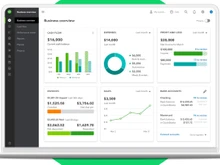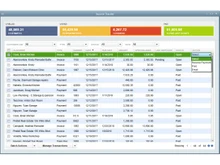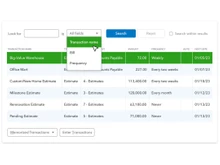Choosing between FreshBooks and QuickBooks can be confusing. The decision between FreshBooks or QuickBooks, however, depends on whether the tool integrates with existing third-party software and automates your bookkeeping process with accuracy.
FreshBooks vs QuickBooks: Overview
FreshBooks and QuickBooks are both feature-packed accounting software with distinct capabilities. Both the tools are tailored to meet the specific needs of different user groups.
FreshBooks is an all-in-one accounting software for small businesses and freelancers, equipped with basic and user-friendly features such as invoicing, expense tracking, projects, estimates, and so on.
QuickBooks, on the other hand, is the accounting software of choice for mid-sized and large organizations, that scales up as your company grows. The software combines comprehensive accounting and reporting features along with strong workflow automation capabilities.
Which software will suit you better depends on factors like user-friendliness of the software, customization options, third-party integrations, and pricing models offered by QuickBooks vs FreshBooks.
FreshBooks vs QuickBooks: Pros and Cons
- The time tracking feature is included with all plans for FreshBooks users; whereas QuickBooks users must use the QuickBooks Time add-on to use this feature.
- The learning curve associated with QuickBooks is steeper in comparison to FreshBooks, making it difficult to operate the software for new users.
- While QuickBooks offers various native integrations with HRMS, time tracking, and payroll software, FreshBooks users are required to pay extra for third-party integrations with payroll and bookkeeping tools.
- QuickBooks has a scalable pricing model with a wide range of features. Though more affordable than QuickBooks, FreshBooks lacks essential modules for accounts payable and bank reconciliation in its Lite Package.
FreshBooks vs QuickBooks: In Terms of Features
- Accounting Features: QuickBooks includes accounting features like bank reconciliation and expense management in all its plans, whereas FreshBooks offers access to these features only in the Plus Plan.
- Invoicing Features: While both FreshBooks and QuickBooks allow users to send unlimited customized invoices, the pricing of FreshBooks for invoicing is less expensive compared to QuickBooks.
- Client Limits: With FreshBooks, there is a restriction on the number of billable clients you can include in some of its paid plans. QuickBooks, on the other hand, does not have a client limit in all its plans. However, there is a system limit of 2,000 clients for individual firms.
- Accountant Access: With QuickBooks, you can avail of the multi-user access feature only in a few paid plans, while FreshBooks allows you to add multiple users in its plans at an additional monthly cost.
- Timekeeping: The time-tracking feature is included in all the paid plans of FreshBooks, allowing you to track time live and retroactively for billing your clients at the accrued time. QuickBooks offers the time tracking feature through QuickBooks Time upgrade at an additional cost. However, the geofencing and shift scheduling features are more streamlined in QuickBooks.
- POS Integration: QuickBooks is the software of choice for you if you need to integrate your accounting software with different sales channels and POS systems. Contrary to FreshBooks and FreshBooks alternatives, QuickBooks offers seamless integration with third-party POS systems, as well as its own POS system called QuickBooks Point of Sales.
- Accounts Receivable: While both QuickBooks and FreshBooks have A/R features, QuickBooks includes more advanced accounts receivable functionalities that integrate with a variety of businesses.
- Reporting: In terms of analytics and reporting, QuickBooks gets an edge over FreshBooks and its substitutes, with customizable reports and pre-saved report templates. FreshBooks, on the other hand, only provides a few non-customizable reports that get auto populated from existing data.
- Payroll Calculation: QuickBooks has native payroll computation functionality in all its paid plans, whereas FreshBooks requires third-party integrations with payroll software to enable payroll calculation and auto-payment of payroll.
- Inventory Management: In addition to payroll features, QuickBooks is also equipped with inventory management features. Although FreshBooks also has inventory management tools, the features are limited compared to QuickBooks.
- Expense Tracking: Expense tracking features are included in both FreshBooks and QuickBooks. However, QuickBooks’ expense tracking feature is included in all its plans, whereas FreshBooks offers this feature only in its high-tiered pricing plans.
FreshBooks vs QuickBooks: User-Friendliness
In terms of user-friendliness, FreshBooks is the clear winner with its intuitive dashboard and easy-to-use features. The complex layout and dashboard of QuickBooks can get overwhelming and difficult to understand for new users.
FreshBooks and its alternatives, on the other hand, are focused on small businesses and offer a comprehensive dashboard and simple layout that can be operated easily without needing much technical expertise.
FreshBooks vs QuickBooks: Interface
The user interface of FreshBooks is designed to be user-friendly and easy to navigate. Users with limited accounting knowledge can also operate the software with ease through the comprehensive dashboard of FreshBooks.
On the contrary, QuickBooks has a complicated dashboard and user interface, which requires professional expertise to operate.
FreshBooks vs QuickBooks: Customization
While FreshBooks allows you to customize invoices as per your preference, QuickBooks is equipped with workflow customization options. QuickBooks users can customize invoices, user roles, and workflow as per their needs.
This allows users to track different fields and synchronize different parties according to their business requirements.
FreshBooks vs QuickBooks: Workflow Automation
FreshBooks offers invoice automation, enabling users to generate invoices by pulling data from contacts and placing this information in customizable templates. This prevents the hassle of manually creating invoices.
QuickBooks automates invoice and A/R management, allowing users to schedule regularly occurring payments and assign process workflow to stakeholders to monitor payment activities.
FreshBooks vs QuickBooks: Integrations
While third-party integrations are available with both accounting tools, QuickBooks surpasses FreshBooks with the number of integrations it offers.
While FreshBooks gives you the option to integrate over 100 applications with your accounting software, QuickBook's vast library of more than 750 integrations allows you to enhance your accounting activities as per your preference.
FreshBooks vs QuickBooks: Pricing
Both QuickBooks and FreshBooks offer multiple pricing plans with a monthly subscription rate and a 30-day free trial.
Comparing FreshBooks vs QuickBooks in terms of pricing, QuickBooks and QuickBooks alternatives are more expensive in comparison to FreshBooks. However, QuickBooks offers various native features that are not available in FreshBooks.
Which is Better, FreshBooks or QuickBooks?
FreshBooks and QuickBooks are leading accounting software solutions, both equipped with distinct features.
FreshBooks primarily targets small businesses and freelancers, offering user-friendly features such as invoicing, expense tracking, and project management. On the other hand, QuickBooks caters to mid-sized and large organizations, providing comprehensive accounting and reporting functionalities along with workflow automation capabilities. QuickBooks offers scalability and versatility, accommodating the growth of businesses over time.
Retrospectively, FreshBooks is a better choice if you prioritize simplicity and ease of use. However, if you run a larger organization with more complex accounting needs, QuickBooks may be the more suitable option.


 18 Ratings & 18 Reviews
18 Ratings & 18 Reviews






























